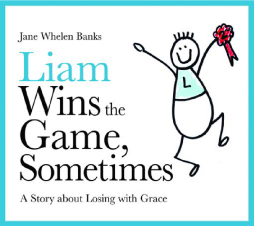
Additional Information
Book Details
Abstract
Liam loves playing games. His favourite game is 'Woof Woof' which he loves to play with Daddy. When Liam collects all the bones and Daddy loses, he says 'Good game Liam'.
When Daddy wins, he gets to shout 'Woof Woof – I win!'. Liam does not like it when he doesn't win.
In Liam Wins the Game, Sometimes, lovable Liam learns that it is ok to feel disappointed if you don't win, but that it's not ok to moan or cry or throw things: sometimes you win and sometimes you don't. He learns how to become a good sport, and that makes him a real champ!
Vibrant, colourful and lively, this book's positive messages and advice are ideal for young children wanting to understand social situations or how friendships work.
Jane Whelen Banks was born and educated in Canada and now lives in Boston, Massachusetts with her family. She holds a masters degree in Health Studies and Advanced Practice Nursing, and is currently working with homeless mothers and children. She has three children of her own, Morgon, Jamie and Liam, all of whom present with their own set of joys and challenges. The Lovable Liam series was created for her youngest son, to help teach some of the social and verbal skills that so often eluded him.
Table of Contents
| Section Title | Page | Action | Price |
|---|---|---|---|
| Preface | |||
| Acknowledgments | |||
| Introduction | |||
| Part I | |||
| Lessons Learned and Guidelines for Program Design | |||
| Introduction to Part I: | |||
| Thinking Development in a World of Disasters | |||
| 1 A Framework for Analyzing Capacities and Vulnerabilities 9 | |||
| 2 First Decisions in Programming | |||
| The Decision to Intervene, 27 | |||
| North-Sou th Partnerships in Disaster Relief, 35 | |||
| 3 The Context of Programming 39 | |||
| The Political Con text, e39 | |||
| The international Policy Context, 42 | |||
| Information Is Power or Who Needs to Know What? 44 | |||
| 4 Dimensions of Programming | |||
| The Myth of Speed, 49 | |||
| Scale of Program, 52 | |||
| Duration of Programming, 54 | |||
| 5 People and Programming | |||
| Project Participants, 61 | |||
| Women and Gender Considerations, 66 | |||
| The Uprooted: Refugees as a Special Case? 68 | |||
| 6 Approaches to Programming | |||
| Personnel (When a Northern NGO In terveiies), 75 | |||
| Expertise, 79 | |||
| Education and Training, 83 | |||
| 7 Cooperation and Accountability in Programming | |||
| Coordination with Other Agencies, 89 | |||
| Monitoring and Evaluation, 92 | |||
| 8 Closing the Gap Between Principles, Policies, and Practice | |||
| Part I1 | |||
| IRDP Case Histories | |||
| Introduction to Part 11: Background and Development of | |||
| IRDP Case Histories | |||
| 9 Wollo Rehabilitation and Disaster Prevention Projects: | |||
| Wollo, Ethiopia | |||
| 10 Ethiopia Emergency Program: | |||
| Yifat na Timugo, Ethiopia | |||
| 11 Proyecto Nueva Vida Armero: | |||
| Armero, Colombia | |||
| 12 Cereal Banks in Burkiqa Faso: | |||
| Food Security, Drought, and Development | |||
| 13 Kordofan Agroforestry Extension Project: | |||
| Northern Kordofan, Sudan | |||
| 14 Earthquake Housing Reconstruction and | |||
| Rural Development: Joyabaj, Quiche, Guatemala | |||
| 15 Local Resource Management Project: | |||
| Santo Domingo, Albay, Bicol Region, Philippines | |||
| 16 Qala en Nahal Refugee Settlement Project: | |||
| Eastern Sudan | |||
| 17 Nomad Program: T i Aicha, Mali | |||
| 18 Promotion of Health Care Among Khmer Refugees: | |||
| Greenhill Site B, Surin, Thailand | |||
| 19 Northeast Thailand Project: Surin, Thailand | |||
| Appendix A: Annotated List ofAdditiona1 | |||
| IRDP Case Histories | |||
| Appendix B: Bibliography |
